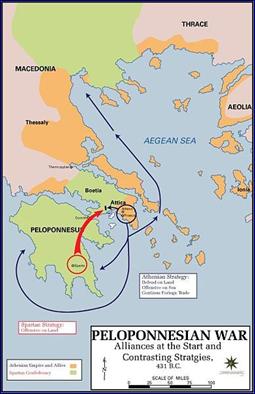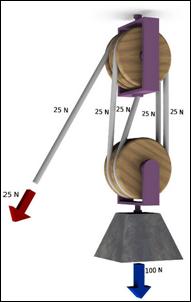V. Practical Politics
either log in or click here to purchase.
Log in here to access video.
Haven't purchased Eye of the Storm Leadership?
Starting Point / The Ghosts of Melos
 Alliances in the Peloponnesian War, 431 B.C. Credit: Wikimedia Commons.
Alliances in the Peloponnesian War, 431 B.C. Credit: Wikimedia Commons.Athenians:  “… you will not think it dishonorable to submit to the greatest city in Hellas, when it makes you the moderate offer of becoming its tributary ally, without ceasing to enjoy the country that belongs to you; nor when you have the choice given you between war and security, will you be so blinded as to choose the worse. And it is certain that those who do not yield to their equals, who keep terms with their superiors, and are moderate towards their inferiors, on the whole succeed best.�
Melians: “Our resolution, Athenians, is the same as it was at first. We will not in a moment deprive of freedom a city that has been inhabited these seven hundred years; but we put our trust in the fortune by which the gods have preserved it until now, and in the help of men, that is, of the Lacedaemonians; and so we will try and save ourselves. Meanwhile we invite you to allow us to be friends to you and foes to neither party, and to retire from our country after making such a treaty as shall seem fit to us both.�[i]
The Athenians, inventers of Western democracy, starved the island into submission, killed the men, and sold every Melian woman and child into slavery.
In the greater sweep of the 27-year Peloponnesian War, the incident at Melos was minor. Melos was in the way of rampaging elephants. With subtlety and nuance, however, Thucydides’ long dialogue records the Melian’s naïve bewilderment at the choices presented by the Athenians: slavery or death, small numbers confronting superior strength, neutrality versus cooptation. What the Athenians ultimately said to the Melians was this: might will always make right, the strong will always do what is in their power to do, the weak must ultimately submit, and if you are not with us you must be against us.
 Swiss Federal Council, 2008. Credit: Wikimedia Commons.
Swiss Federal Council, 2008. Credit: Wikimedia Commons.The origins of the Swiss approach to domestic and foreign affairs date back 400 years. Before it was a country, Switzerland was a loose federation of cities, states, and cantonments without a central government. The Charter of Wil, concluded in 1647, created a joint defense for the common good and the country’s first declaration of neutrality. It was a bulwark against the predations and disputes of larger neighbors and, equally important, a way of managing its internal politics in a democratic manner.
In contrast, Melos, the small Mediterranean city-state, was a weak pawn pleading the moral high ground of non-alignment in the face of overwhelming and brutal forces. Their eloquent arguments were ignored and they were crushed. Switzerland, with its defensive hedgehog strategy, suggests another approach, more muscular in its impartiality, and one grudgingly respected by others who are in every way bigger and stronger.

41Â Â Â Â Â Power
“Power corrupts. Knowledge is power. Study hard. Be evil.� Anon (Wikiquote)
 Power is “Work Done� - Energy Transfer in a Pulley. Credit: Wikimedia Commons.
Power is “Work Done� - Energy Transfer in a Pulley. Credit: Wikimedia Commons.
42Â Â Â Â Open Lines
“I didn’t miss the rat race, but I kinda missed the rats.� Jerry Nachman
|
|
This site managed with Dynamic Website Technology
from Mediate.com Products and Services |
